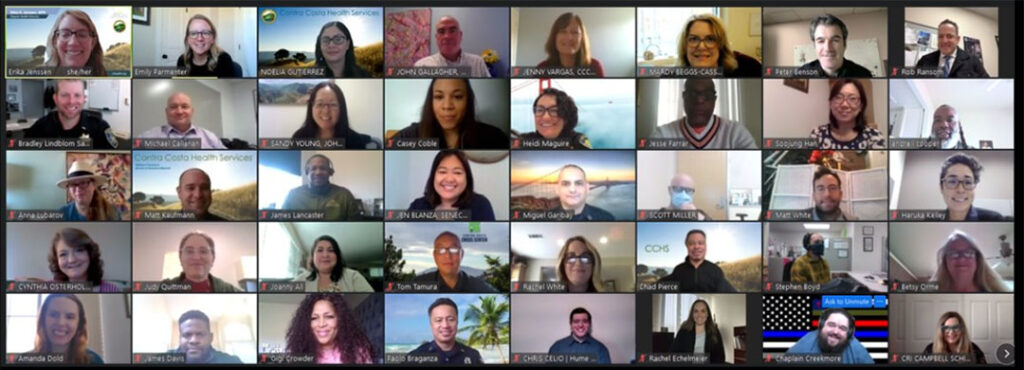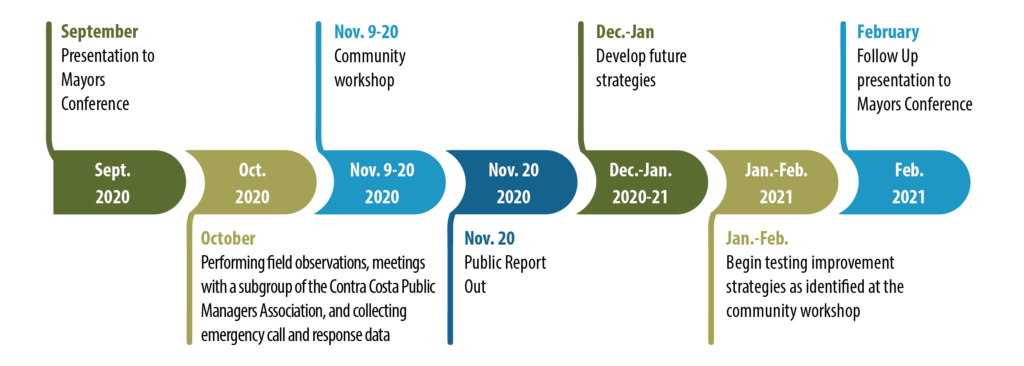To connect residents with the most appropriate resources
Working in partnership with cities across Contra Costa County, Contra Costa Health Services (CCHS) has launched a comprehensive review of existing behavioral health crisis response services to develop a vision for how to connect residents with the most appropriate resources where and when they are needed.
In close collaboration with city leaders through the Contra Costa Public Managers Association, community stakeholders, service providers and staff from across the county participated in a multi-day workshop to identify current resources and next steps. Workshop participants included those working in crisis response, community-based organizations, schools, police and dispatch, as well as clinicians and persons and family members with lived experiences. The team spent the past two weeks observing, analyzing and interviewing subject matter experts and looking at data about the current state of crisis response in Contra Costa County to develop a vision for the future and identify areas for improvement.
Statistics
- Behavioral health issues are widespread
- About one in five adults are currently experiencing behavioral health issues
- About 13% of all EMS calls address mental health issues
- There are between 10,000 and 11,000 involuntary psychiatric holds (5150s) in our county each year
Existing Resources
- CCHS provides a variety of behavioral health services. A limited number provide crisis response, however none provide emergent response like 911.
- Crisis Intervention Training (CIT)
- Homeless Services (H3 & HCH)
- Alcohol & Other Drug Services
- Medical and Psychiatric Emergency Services
- Behavioral Health Crisis Teams
- Existing crisis response resources serve a small number of residents
- Mental Health Evaluation Team (MHET) serves 293 people annually at a cost of $2 million
- Designed to reduce law enforcement repeat calls for service and violent encounters, reduce visits to Psychiatric Emergency Services, increase community and police safety, and increase appropriate use of mental health services.
- Mobile Crisis Team (MCRT) takes about 1,600 calls per year at a cost of $2 million, serves adults only
- MCRT is designed to have mental health providers respond in the field to de-escalate crisis, provide stabilization, and prevent psychiatric hospitalization. If the situation cannot be de-escalated in the field, the MCRT will assess for 5150 criteria and, if criteria are met, the Mental Health Clinical Specialist can initiate a 72-hour 5150 involuntary hold.
- In addition to responding in the community to the immediate situation that led to calling the MCRT, the team provides a 30-day period of follow up during which they focus on linking individuals to a variety of services to help them stabilize and prevent ongoing crisis experiences.
- Mobile Response Team (MRT) receives about 1,000 calls from youth each year, budget is $2.2 million
- Mental Health Evaluation Team (MHET) serves 293 people annually at a cost of $2 million
- MRT provides risk/safety assessments, crisis intervention, follow up services, collaboration with existing treatment team members and linkage for youth in their natural settings. The CCC MRT aims to provide same day services and/or services as close to 24 hours of immediate crisis.
- We have researched models from other communities
- Regardless of what model we choose, the key to success is alignment with our cities and community partners across the county.
The public is invited to hear the key findings and recommendations during a public report to be shown on Contra Costa Television (CCTV) on Saturday, November 21 at noon and 7 p.m., and Sunday, November 22 at 9 a.m. and 6 p.m. The event can also be seen online at contracostatv.org during those scheduled times.
The process prioritized these areas of focus for the next steps:
- Identifying a single number to call for behavioral health crisis response
- Establishing a mobile crisis 24/7 response
- Evaluating non-police mobile crisis team composition
- Identifying alternate destinations for those experiencing a behavioral health crisis
Using the Lean Process Improvement Model, the team will spend the next several months planning for rapid improvement workshops to test potential strategies based on the four areas of focus. Results of this process will be presented to the Contra Costa Mayors Conference in February 2021.
For more information on CCHS Community Crisis Response, visit cchealth.org/bhs/crisis-response.



Leave a Reply